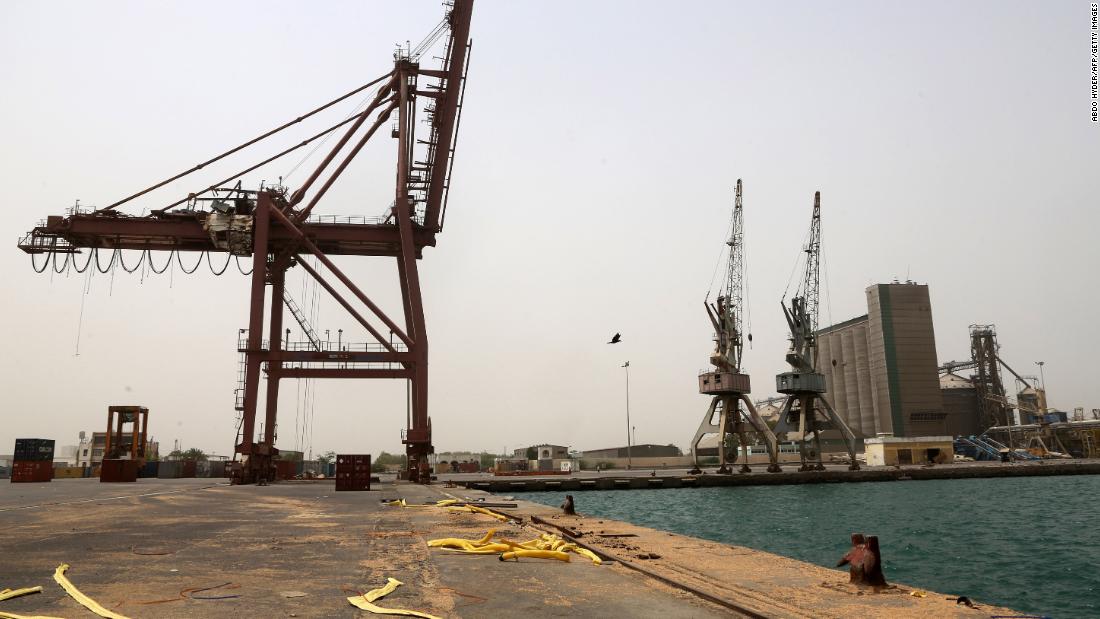The arrival of the vessel, the Thuruya, registered in Gabon, follows a UN announcement on Wednesday that the internationally recognized government of Yemen – supported by Saudi Arabia and its military – has agreed to allow four ships carrying fuel to unload in Hodeidah. It was not clear whether the relaxation was temporary or a permanent change.
A CNN investigation earlier this month revealed that Saudi warships were preventing all oil tankers from docking at the port, including 14 ships that had obtained approval for a United Nations release mechanism to dock. The investigation generated calls from the UN envoy to Yemen, Martin Griffiths, and the WFP head, David Beasley, to Saudi Arabia to lift the blockade and allow fuel to enter the country.
The 14 ships have been awaiting clearance for months in the Saudi port of Jazan, on the Red Sea. Thuruya was due to dock in Hodeidah on November 5, shows a UN release certificate, and maritime tracking applications confirm that he was anchored in the Red Sea waiting 141 days until Thursday. The other 10 are still awaiting release.
The Saudi-led coalition has imposed a sea and air blockade around northern Yemen for years, where about 80% of the population lives. Aid was allowed to arrive through Hodeidah – but not the fuel needed to deliver it.
Amar Aladrai, the executive general manager of the Yemen National Oil Company, controlled by Houthi, told CNN on Thursday that Thuruya had docked, while maritime tracking applications showed the tanker in port.
However, he said Yemen needed a lot more to get there.
“Our needs are immense and, as we received nothing in the first quarter of this year, the 29,000 tonnes of diesel transported by Thuraya will cover just 8% of the needs of our public sector. It will provide partial coverage for our health needs, but everything else; electricity, sanitation, water, etc. all of these will still struggle. This is far from enough, “he told CNN.
“A partial release will not solve this.”
Saudi Arabia justified the blockade by accusing the Houthis of diverting taxes on fuel arriving in Hodeidah to finance their war effort, a claim also made by the United States and the United Nations.
Thursday marked six years of war in Yemen, where famine began to spread in the north and threatens to hit the country if humanitarian agencies cannot deliver food aid on a more regular and broader basis than limited funding and scarcity of food. fuel currently allow.
CNN witnessed the impact of fuel shortages on trucks loaded with food, medicine and other basic necessities standing in a line running for miles near Hodeidah, unable to move without enough fuel.
A humanitarian source in Yemen told CNN that the amount of fuel coming in was far from adequate.
“There are four vessels that may cover half of the fuel requirements for a month. But almost three months have passed without fuel, in addition to six months of irregular supply. You cannot drip fuel for food.”
Allowing more fuel to enter the country will help hospitals and families to keep their generators running, but none of the four ships cleared to dock are carrying gasoline, which most Yemenis use as a transport to reach basic goods and services.
Yemenis have had to queue for days regularly this year to buy limited fuel supplies and often turn to the black market, paying inflated prices to fuel their vehicles.
US State Department spokesman Ned Price welcomed the fact that four fuel ships were cleared to dock, saying the free flow of fuel was critical to supporting aid delivery.
“The fuel must go to Yemeni markets without delay to supply hospitals, ensure the delivery of food and access to water and, in general, help to alleviate the suffering of the Yemeni people,” he said in a statement, saying it was a ” step in the right direction. “
He also called on the Houthi rebels to end their offensive under Marib’s governorship and agree to a ceasefire.
“We ask all parties to come to the table to negotiate for the good of Yemen and its people,” said Price.
Barbara Arvanitidis, Jennifer Hansler and Richard Roth of CNN contributed to this report.
